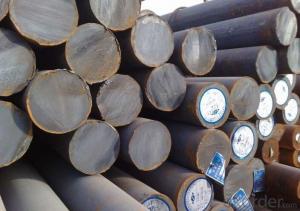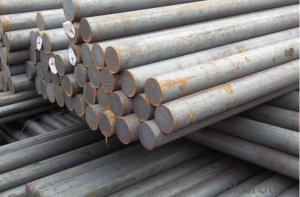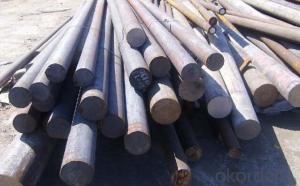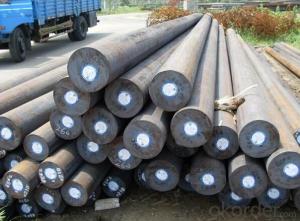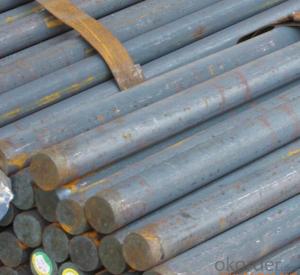EN19/30CrMo A30302 /4130/SCM430/25CrMo4 1.7218 alloy structural steel round bar
- Loading Port:
- Tianjin
- Payment Terms:
- TT or LC
- Min Order Qty:
- 3 m.t.
- Supply Capability:
- 10000 m.t./month
OKorder Service Pledge
OKorder Financial Service
You Might Also Like
Item specifice
EN19/30CrMo(A30302)/4130/SCM430/25CrMo4(1.7218) alloy structural steel round bar
Name | Steel Round Bar |
Shape | Round Bar/Square Bar/Flat Bar/Plate/Wire |
Standard | GB/ASTM/SAE/AISI/DIN/JIS/EN/BS |
Surface Treatment: | Black/Peeling/Polished/Machined |
Delivery Condition: | Hot Rolled or Forged/Peeled or Black Surface |
Test | SGS/UT 100% Elements Testing |
Certificate: | ISO/Mill Certificate |
Service: | 24 hours online service / |
more than 20 years trading and manufacture | |
Quality Assurance: | the third party inspection, such as SGS, BV, TUV…etc. is acceptable |
Packaging Details: | seaworthy packaging or as per customer's packing instruction |
Chemical Composition
C | Si | Mn | Cr | Mo | P | S | Cu | Ni |
0.26-0.34 | 0.17-0.37 | 0.40-0.70 | 0.80-1.10 | 0.15-0.25 | ≤ 0.035 | ≤0.035 | ≤0.30 | ≤0.30 |
Mechanical Properties
Tensile strength | Yield strength | Elongation rate | Contractibility rate | Hardness | Impact energy |
≥930MPa | ≥785MPa | ≥12% | ≥50% | ≤229 | ≥63J |
Packaging & Delivery
Packaging Detail | Sea worthy packing /as per customer's packing instruction |
Delivery Detail | 15 ~ 40 days after receiving the deposit |
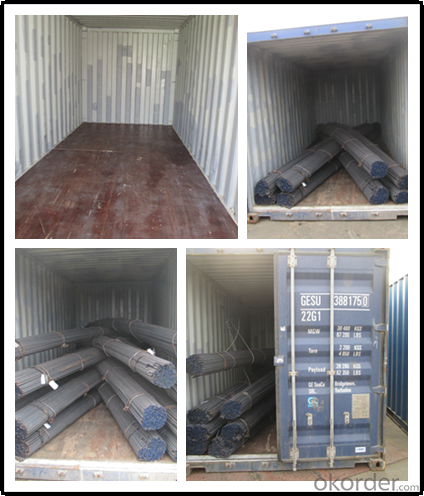
Product Show
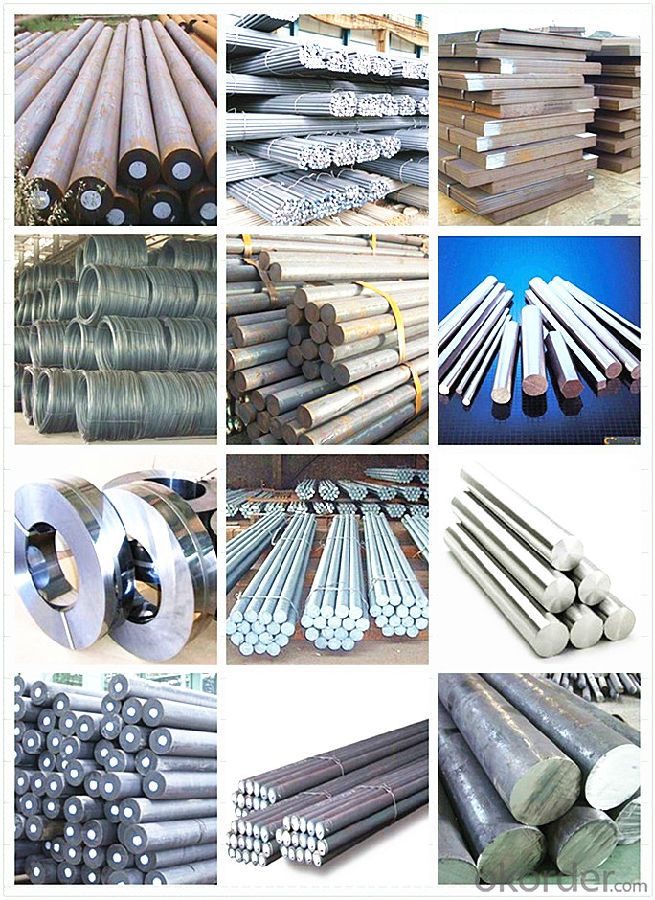
Workshop
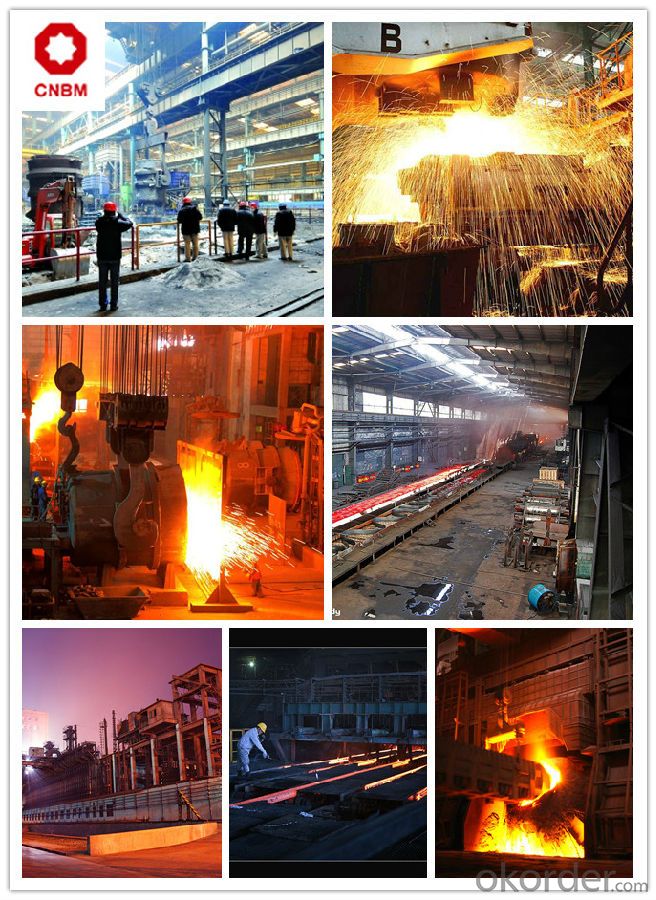
FAQ
Are you a trading company or manufacturer? | Manufacturer |
What’s the MOQ? | 3 metric ton |
What’s your delivery time? | 15-35 days after downpayment received |
Do you Accept OEM service? | Yes |
what’s your delivery terms? | FOB/CFR/CIF |
What's the Payment Terms? | 30% as deposit,70% before shipment by T/T |
Western Union acceptable for small amount. | |
L/C acceptable for large amount. | |
Scrow ,Paybal,Alipay are also ok | |
Why choose us? | Chose happens because of quality, then price, We can give you both. |
Additionally, we can also offer professional products inquiry, products knowledge train (for agents), smooth goods delivery, excellent customer solution proposals. | |
What's your available port of Shipment? | Main Port, China |
What’s your featured services? | Our service formula: good quality+ good price+ good service=customer's trust |
Where are your Market? | Covering more than 160 countries in the world |
Special steel and there is no uniform definition of the concept of special steel is generally considered to have a special chemical composition (alloying), using a special production process, with a special organization and performance to meet the special needs of the steel type. Compared with ordinary steel, special steel has a higher strength and toughness, physical properties, chemical properties, biocompatibility and process performance.
China and Japan, the EU definition of special steel closer, into the special steel quality carbon steel, alloy steel, high alloy steel (alloying elements greater than 10%) three categories, including steel and high-alloy special steel production accounted for 70%. The main advantages of special steel carbon structural steel, carbon tool steel, carbon spring steel, alloy spring steel, alloy steel, ball bearing steel, alloy tool steel, high alloy tool steel, high speed tool steel, stainless steel, heat-resistant steel , and high-temperature alloys, precision alloy, electric alloy. There are nearly 2,000 special steel grades, about 50,000 varieties and specifications in the world currently. In addition to a wide range of special steel outside, in the specification with ordinary steel also showed different characteristics. In addition to plates, tubes, wire, strip, rods and profiles outside, as well as composite materials, surface alloying material, surface treatment material, forging materials, precision casting, powder metallurgy products.
- Q:How does special steel contribute to the industrial machinery aftermarket industry?
- By providing high-quality and durable components, special steel plays a vital role in the industrial machinery aftermarket industry. It enhances machinery performance and longevity, which is crucial in this industry. One of the main advantages of special steel is its exceptional strength and resistance to wear and tear. Regular steel components deteriorate quickly due to heavy loads, extreme temperatures, and corrosive environments. However, special steel alloys are specifically designed to withstand these harsh conditions. This ensures that machinery operates efficiently for a longer period. In addition, special steel offers excellent machinability, making it easier to manufacture intricate and precise components. This enables aftermarket manufacturers to produce replacement parts that fit perfectly into existing machinery. As a result, downtime during repairs and maintenance is minimized. Special steel's machinability also allows for customization, as it can be easily shaped and modified according to the specific requirements of different machinery models. Moreover, special steel's exceptional heat resistance makes it ideal for producing high-temperature components used in industrial machinery. These components need to withstand intense heat without losing their structural integrity. Special steel alloys possess excellent heat resistance properties, ensuring that machinery can operate at high temperatures without compromising performance or safety. Furthermore, special steel contributes to the industrial machinery aftermarket industry by providing corrosion-resistant components. Machinery in industries such as oil and gas or marine is often exposed to corrosive substances or environments. Regular steel components are susceptible to corrosion, leading to premature failure and expensive repairs. However, special steel alloys are highly resistant to corrosion, enhancing the durability and reliability of machinery in these demanding conditions. Overall, special steel's unique properties, including strength, machinability, heat resistance, and corrosion resistance, significantly contribute to the industrial machinery aftermarket industry. By utilizing special steel components, manufacturers can enhance machinery performance, durability, and longevity, reducing downtime, and improving overall operational efficiency.
- Q:How does special steel contribute to the toughness of products?
- Special steel contributes to the toughness of products through its superior strength, durability, and resistance to wear and corrosion. This high-quality steel is specifically engineered to possess exceptional mechanical properties and enhanced toughness, making it ideal for demanding applications. Its ability to withstand extreme conditions, impacts, and heavy loads ensures that products made from special steel are long-lasting, reliable, and capable of enduring harsh environments.
- Q:How is special steel used in the packaging supply chain?
- Special steel is commonly used in the packaging supply chain for manufacturing various types of packaging machinery and equipment. It is utilized to create robust and durable components such as blades, cutters, molds, and dies that are essential for shaping, cutting, and forming packaging materials. The strength, hardness, and wear resistance properties of special steel make it ideal for withstanding the high pressures and repetitive movements involved in the packaging process. Additionally, special steel is also used in the construction of storage racks and shelves, ensuring the safe and secure storage of packaged goods throughout the supply chain.
- Q:What are the different casting techniques used for special steel?
- There are several casting techniques used for special steel, including investment casting, sand casting, centrifugal casting, and continuous casting. Each technique has its own advantages and is suitable for specific applications. Investment casting is known for its precision and ability to produce intricate shapes, while sand casting is cost-effective and versatile. Centrifugal casting is used to create cylindrical shapes with high strength, and continuous casting is employed for mass production of steel products.
- Q:Can special steel be used in the renewable energy sector?
- Indeed, the renewable energy sector can effectively utilize special steel. This type of steel, also referred to as alloy steel, offers improved qualities such as exceptional strength, longevity, and resistance to corrosion, rendering it suitable for a diverse range of applications within renewable energy technologies. Within the realm of wind energy, special steel is employed for the production of wind turbine components. Wind turbine towers necessitate materials that are both robust and lightweight in order to withstand the dynamic loads and harsh environmental conditions they encounter. Special steel alloys, including high-strength low-alloy (HSLA) steel, provide the requisite strength-to-weight ratio, thereby ensuring the structural integrity of wind turbine towers. Furthermore, special steel proves advantageous in the field of solar energy. Concentrated solar power (CSP) plants rely on mirrors or lenses to concentrate sunlight, generating intense heat for the purpose of electricity generation. In the construction of these components, special steel alloys possessing high thermal conductivity and the ability to withstand high temperatures are employed. This ensures efficient energy capture and durability. In addition, special steel plays a crucial role in the manufacturing of equipment for hydroelectric power generation. Turbine components, such as blades, shafts, and runners, necessitate materials with exceptional strength and resistance to erosion and cavitation. Special steel alloys, including stainless steel and tool steel, exhibit these characteristics, guaranteeing the longevity and reliability of hydroelectric power systems. In summary, special steel finds widespread application within the renewable energy sector. Its qualities, such as high strength, durability, and resistance to corrosion, make it suitable for use in wind energy, solar energy, and hydroelectric power generation. Through the utilization of special steel, the renewable energy sector can enhance the performance, efficiency, and lifespan of various renewable energy technologies.
- Q:What are the different methods for joining special steel?
- There are several methods for joining special steel, including welding, brazing, soldering, and mechanical fastening. Welding involves melting the steel pieces together using heat and filling the gap with a molten filler material. Brazing uses a lower melting point filler material to join the steel pieces together. Soldering is a similar process to brazing but uses an even lower melting point filler material. Mechanical fastening includes methods such as bolting, riveting, or using adhesives to hold the steel pieces together.
- Q:How does special steel perform in high-temperature oxidation conditions?
- Special steel, otherwise known as heat-resistant or high-temperature steel, is designed specifically to excel in conditions of high-temperature oxidation. At elevated temperatures, oxidation occurs as a chemical reaction between the metal and oxygen, potentially resulting in the degradation or failure of the material due to the formation of metal oxides. Nevertheless, special steel contains alloying elements that offer exceptional resistance to oxidation. These alloying elements, such as chromium, aluminum, and silicon, create a protective layer of oxides on the steel's surface when exposed to high temperatures. This layer acts as a barrier, preventing further oxidation of the underlying metal. Moreover, the alloying elements can promote the formation of stable and adherent oxide scales, further enhancing the steel's resistance to oxidation. The outstanding performance of special steel in high-temperature oxidation conditions can be attributed to several factors. Firstly, the alloying elements in the steel composition ensure the formation of a protective oxide layer, effectively shielding against further oxidation. Secondly, the steel's microstructure is specifically designed to maintain stability and retain its mechanical properties even at elevated temperatures. In addition, special steel undergoes stringent heat treatment processes to enhance its resistance to high-temperature oxidation. Heat treatment methods such as annealing, quenching, and tempering optimize the steel's microstructure and eliminate impurities, guaranteeing optimal performance in extreme conditions. In summary, special steel showcases remarkable resistance to high-temperature oxidation conditions due to its carefully chosen alloying elements, tailored microstructure, and optimized heat treatment processes. It provides a dependable and long-lasting solution for various industries that require materials capable of withstanding severe oxidation environments, ensuring optimal performance and durability in these challenging conditions.
- Q:How does special steel contribute to the mining machinery industry?
- Special steel plays a crucial role in the mining machinery industry by offering exceptional strength, durability, and resistance to wear and corrosion. This type of steel is specifically engineered to withstand the harsh and demanding conditions that are typically encountered in mining operations. In the mining machinery industry, equipment such as drills, excavators, loaders, crushers, and conveyor systems are subjected to extreme stress, heavy loads, and abrasive materials. Special steel components can be found in various parts of these machines, including buckets, tracks, cutting edges, gears, and hydraulic components. The high strength and toughness of special steel ensure that mining machinery can withstand the immense forces and impacts involved in excavation, hauling, and processing of minerals. This durability helps to extend the lifespan of the equipment, reducing the need for frequent replacements and minimizing downtime, which ultimately leads to cost savings for mining companies. Moreover, special steel's resistance to wear and corrosion is vital in the mining industry. The presence of abrasive materials and corrosive substances in the mining environment can lead to rapid deterioration of machinery components. However, special steel alloys are designed to resist wear and corrosion, thereby enhancing the longevity and performance of mining machinery. Additionally, special steel enables mining machinery to operate efficiently and effectively. Its high strength-to-weight ratio allows for the construction of lightweight yet robust equipment, improving mobility and productivity in mining operations. The use of special steel also enables the design of complex components with intricate shapes, ensuring optimal functionality and performance. Overall, special steel is an indispensable material in the mining machinery industry. Its exceptional strength, durability, resistance to wear and corrosion, and ability to enhance efficiency make it a vital component in the design and construction of mining equipment. By incorporating special steel, mining machinery can withstand the harsh conditions and heavy-duty tasks involved in mining operations, ultimately contributing to increased productivity, reduced costs, and improved safety in the industry.
- Q:What are the properties of precipitation-hardening steel?
- Precipitation-hardening steel, also known as PH steel, possesses unique properties that make it highly sought after in various industries. This type of steel has the remarkable ability to be strengthened through a precipitation process, resulting in improved mechanical properties. Some key properties of precipitation-hardening steel include excellent strength, good corrosion resistance, and the ability to maintain these properties at high temperatures. Additionally, PH steel offers good weldability and machinability, making it suitable for a wide range of applications where strength, durability, and resistance to wear and tear are crucial.
- Q:What are the common challenges in heat treating special steel?
- Heat treating special steel can present a variety of challenges. One common challenge is achieving the desired hardness and strength while maintaining the desired microstructure. Special steels often require specific heat treatment processes, such as quenching and tempering, to achieve the desired mechanical properties. However, the high alloy content of these steels can lead to difficulties in achieving uniform heat distribution and controlling the cooling rate during quenching, which in turn can result in inconsistent hardness and potential distortion. Another challenge in heat treating special steel is managing residual stresses. During the heating and cooling process, differential thermal expansion and contraction can cause stress to build up within the steel, leading to potential cracking or distortion. Special care must be taken to minimize these stresses through proper heat treatment techniques, such as preheating and controlled cooling rates. Special steels often have stringent cleanliness requirements, as impurities or non-metallic inclusions can negatively impact their mechanical properties. Ensuring the cleanliness of the steel prior to heat treatment can be challenging and may require additional steps such as degreasing, pickling, or using protective atmospheres during heat treatment. Furthermore, some special steels are highly sensitive to overheating, which can lead to grain growth and loss of desired properties. Precise temperature control and monitoring are crucial to prevent overheating and ensure consistent results. Lastly, special steels may have specific time-temperature transformation (TTT) and continuous cooling transformation (CCT) characteristics that need to be considered during heat treatment. Understanding and adhering to the appropriate heating and cooling cycles are essential for achieving the desired microstructure and properties. In summary, the common challenges in heat treating special steel include achieving the desired hardness and microstructure, managing residual stresses, ensuring cleanliness, preventing overheating, and adhering to specific time-temperature transformation characteristics. Overcoming these challenges requires expertise, precise control, and adherence to strict heat treatment protocols.
1. Manufacturer Overview |
|
|---|---|
| Location | |
| Year Established | |
| Annual Output Value | |
| Main Markets | |
| Company Certifications | |
2. Manufacturer Certificates |
|
|---|---|
| a) Certification Name | |
| Range | |
| Reference | |
| Validity Period | |
3. Manufacturer Capability |
|
|---|---|
| a)Trade Capacity | |
| Nearest Port | |
| Export Percentage | |
| No.of Employees in Trade Department | |
| Language Spoken: | |
| b)Factory Information | |
| Factory Size: | |
| No. of Production Lines | |
| Contract Manufacturing | |
| Product Price Range | |
Send your message to us
EN19/30CrMo A30302 /4130/SCM430/25CrMo4 1.7218 alloy structural steel round bar
- Loading Port:
- Tianjin
- Payment Terms:
- TT or LC
- Min Order Qty:
- 3 m.t.
- Supply Capability:
- 10000 m.t./month
OKorder Service Pledge
OKorder Financial Service
Similar products
New products
Hot products
Hot Searches
Related keywords

